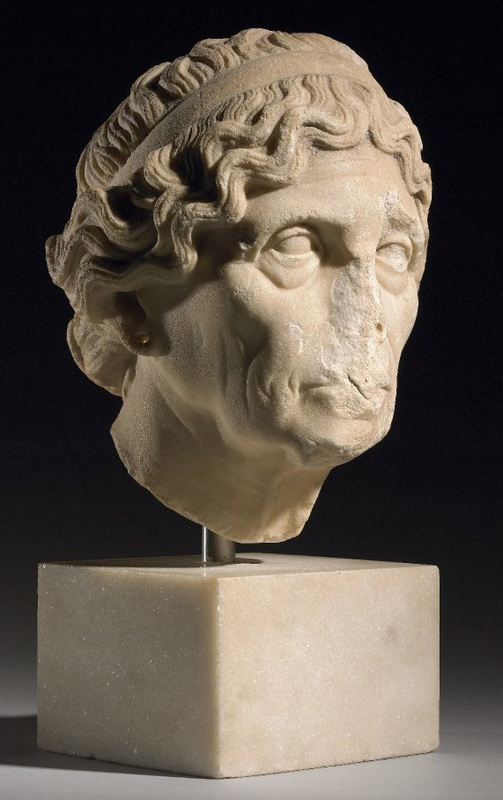Head of Lysimache
Title
Head of Lysimache
Date
Classical, 380-350 BCE (original).
Artist or Workshop
Demetrios of Alopece (original)
Materials
Roman marble head, copy of a full-body Greek bronze
Height of the work
37.5 cm tall
Provenience
Under a pavement in Tarquinia, Italy. Bronze original sited on Acropolis, Athens, Greece.
Current Location
The British Museum, London, England
Sitter Biography
Lysimache was a priestess of Athena Polias in the mid 5th century BCE. She was priestess for 64 years and lived to age 88.
Description and Significance
Description:
The face of this near life-sized bust is severely damaged, with much of the nose and upper lip missing. Still, sufficient evidence remains to characterize her age and physiognomy. The head thrusts forward, with the neck at an angle. Heavy bags appear under Lysimache's deep set eyes. Her cheeks, forehead, and neck are deeply creased. Loose folds of skin hang from her jaw. Her expression is serious and careworn.
Both earlobes are pierced to hold ornaments. A ribbon (fillet) surrounding her head marks her as a priestess about to perform a religious ritual. Her short wavy hair is parted in the middle. A statue base found on the Acropolis, thought to be for the bronze original, has the following inscription:
[This . . . Lysimache] was by her descent (daughter) of Drakontides; she completed [eighty-eight] years; . . . sixty-four years she [served] Athena and lived to see four [generations] of children. [Lysimache] mother of -
[Demetrios] made it.
The inscription makes no mention of the donor. Most scholars assume it was commissioned by the demos of Athens after Lysimache's death in recognition of her long service.
Significance:
This marble copy is an example of Late Classical realism, eschewing idealization of earlier classical Greek sculpture, which typically rendered women as uniformly youthful and beautiful. The serious face conveys deep character; the forward thrust of the head expresses an almost aggressive sense of status. However, whether this stands as as accurate portrait of a known historical personage still remains up for question. Descriptions of the sculptor Demetrios's other works (none of which survive) indicate he specialized in exaggeration and caricature.
Lysimache's status as a cult priestess makes the unflinching portrayal of old age appropriate to the gravitas of her position. If not an exact likeness, it can be read as a genre portrait of a woman whose priestly function comports with age and experience.
The face of this near life-sized bust is severely damaged, with much of the nose and upper lip missing. Still, sufficient evidence remains to characterize her age and physiognomy. The head thrusts forward, with the neck at an angle. Heavy bags appear under Lysimache's deep set eyes. Her cheeks, forehead, and neck are deeply creased. Loose folds of skin hang from her jaw. Her expression is serious and careworn.
Both earlobes are pierced to hold ornaments. A ribbon (fillet) surrounding her head marks her as a priestess about to perform a religious ritual. Her short wavy hair is parted in the middle. A statue base found on the Acropolis, thought to be for the bronze original, has the following inscription:
[This . . . Lysimache] was by her descent (daughter) of Drakontides; she completed [eighty-eight] years; . . . sixty-four years she [served] Athena and lived to see four [generations] of children. [Lysimache] mother of -
[Demetrios] made it.
The inscription makes no mention of the donor. Most scholars assume it was commissioned by the demos of Athens after Lysimache's death in recognition of her long service.
Significance:
This marble copy is an example of Late Classical realism, eschewing idealization of earlier classical Greek sculpture, which typically rendered women as uniformly youthful and beautiful. The serious face conveys deep character; the forward thrust of the head expresses an almost aggressive sense of status. However, whether this stands as as accurate portrait of a known historical personage still remains up for question. Descriptions of the sculptor Demetrios's other works (none of which survive) indicate he specialized in exaggeration and caricature.
Lysimache's status as a cult priestess makes the unflinching portrayal of old age appropriate to the gravitas of her position. If not an exact likeness, it can be read as a genre portrait of a woman whose priestly function comports with age and experience.
References
Breckenridge, J.D. Likeness: A Conceptual of Ancient Portraiture,
Evanston, 1968, pp. 99-101.
Dillon, Sheila. The Female Portrait Statue in the Greek World,
Cambridge University Press, 2010, pp. 24, 27, 50-51.
Keesling, Catherine. "Syeris, Diakonos of the Priestess
Lysimache on the Athenian Acropolis," Hesperia, v
Evanston, 1968, pp. 99-101.
Dillon, Sheila. The Female Portrait Statue in the Greek World,
Cambridge University Press, 2010, pp. 24, 27, 50-51.
Keesling, Catherine. "Syeris, Diakonos of the Priestess
Lysimache on the Athenian Acropolis," Hesperia, v
Contributor
Mark Weadon
Citation
Demetrios of Alopece (original), “Head of Lysimache,” Digital Portrait "Basket" - ARTH488A - "Ancient Mediterranean Portraiture", accessed June 6, 2025, https://classicalchopped2.artinterp.org/omeka/items/show/25.
Item Relations
This item has no relations.

